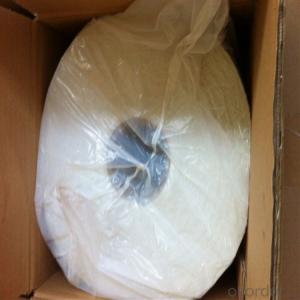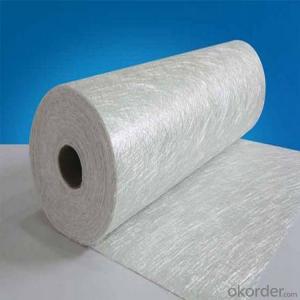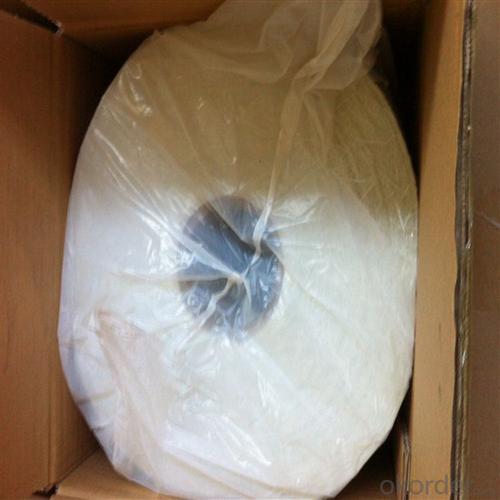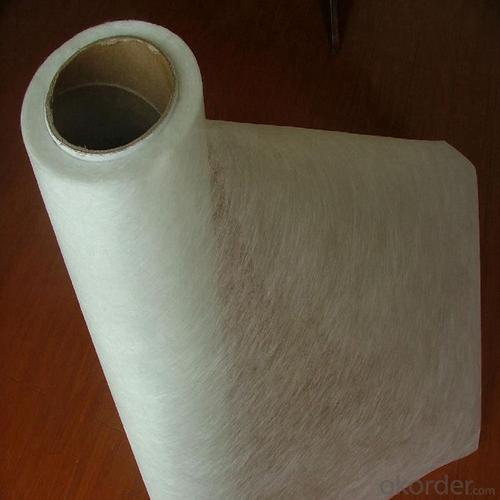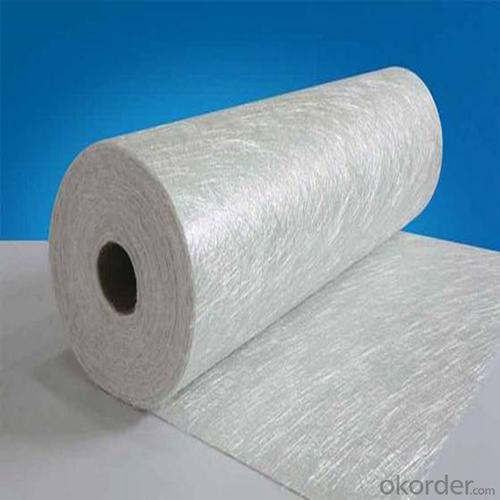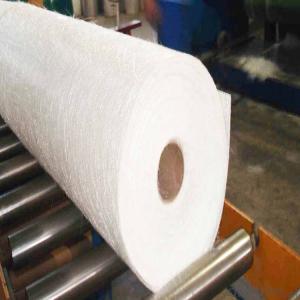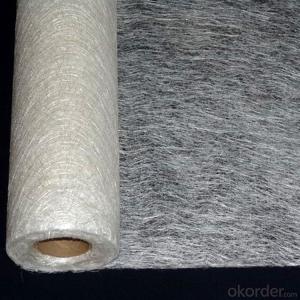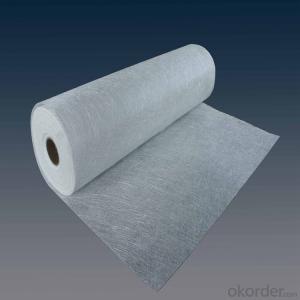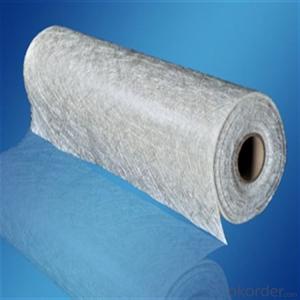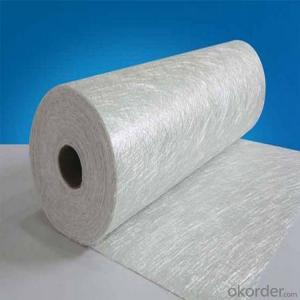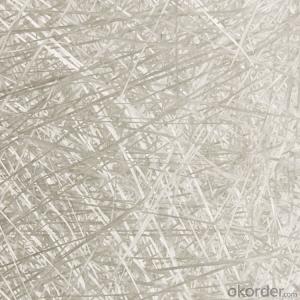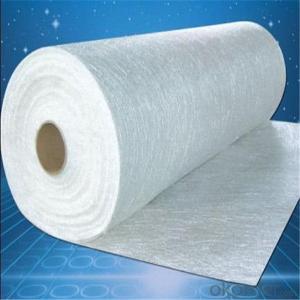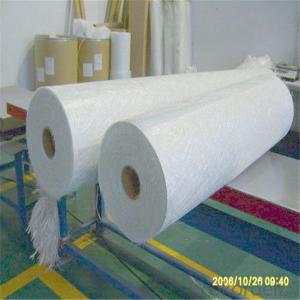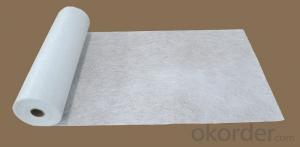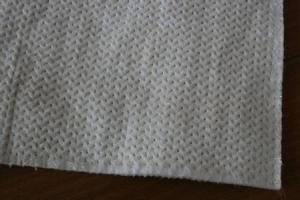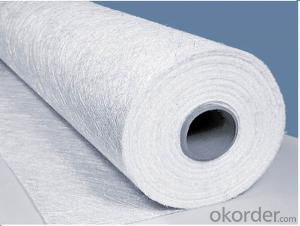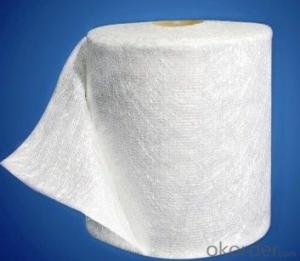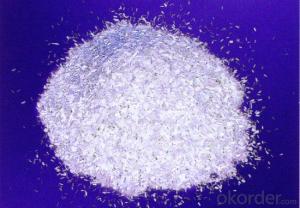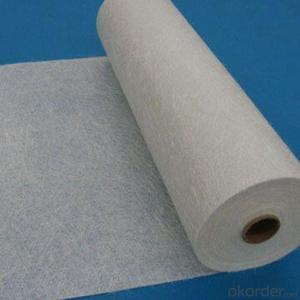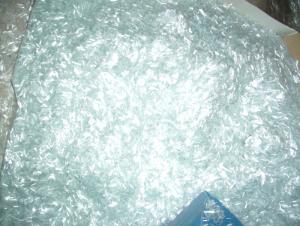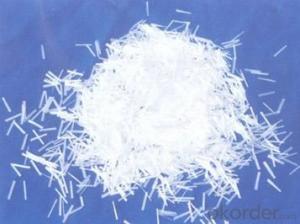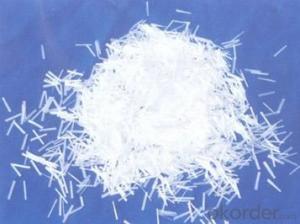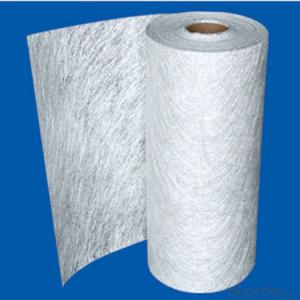Fiberglass Chopped Strand Mat for FRP Pipe / Heated Floor Mat
- Loading Port:
- China main port
- Payment Terms:
- TT OR LC
- Min Order Qty:
- 50 kg
- Supply Capability:
- 10000 kg/month
OKorder Service Pledge
OKorder Financial Service
You Might Also Like
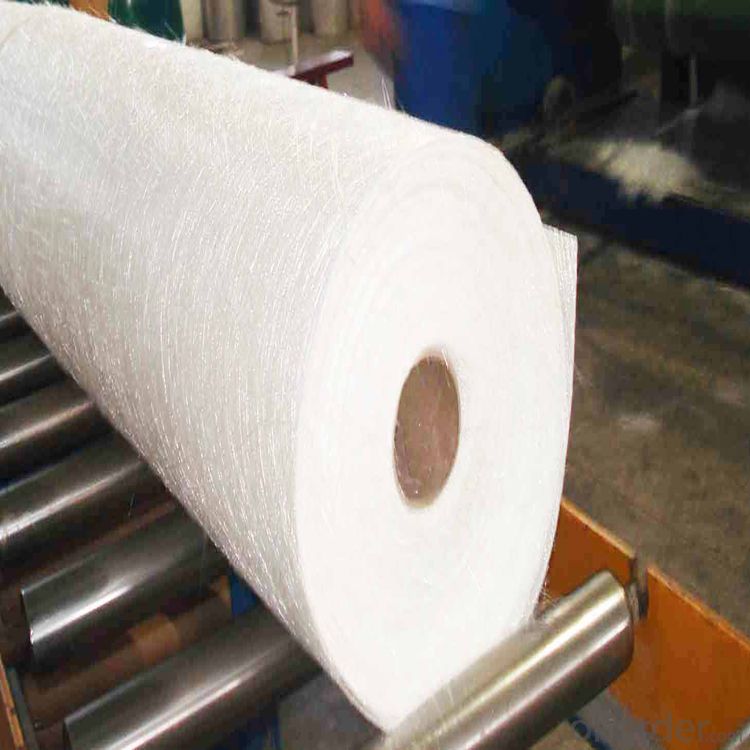
Product Description:
Chopped strand mat is made from chopped glass fibers, which are bonded with powder or emulsion binders. It can be used in hand lay-up process and continuous laminating process to produce FRP products, such as plates, lighting board, hull, bathtub, cooling towers, anti-corrosion materials, vehicles.
Features:
Uniform thickness, softness and hardness good.
Good compatibility with resin, easy completely wet-out.
Fast and consistent wet-out speed in resins and good manufacturability.
Good mechanical properties, easy cutting.
Good cover mold, suitable for modeling complex shapes.
Application:
fiberglass thickness is suitable for application by hand lay-up, reinforce and machine FRP molding,
including interior decoration of vehicles, boat hulls, complete set of sanitary equipment, anticorrosive pipes, tanks, building materials, tables, chairs, panels and all kind of composite FRP products.
Specifications:
Item | Over Density | Moisture Content | Chop Density | Polyester Yarn | Width |
(g/m2) | (%) | (g/m2) | (g/m2) | (mm) | |
EMK300 | 309.5 | ≤0.15 | 300 | 9.5 | 50-3300 |
EMK380 | 399 | 380 | 19 | ||
EMK450 | 459.5 | 450 | 9.5 | ||
EMK450 | 469 | 450 | 19 | ||
EMC0020 | 620.9 | 601.9 | 19 | ||
EMC0030 | 909.5 | 900 | 9.5 |
Special products are available according to customer’s requirement.
Product Packaging:
Each Surface Tissue is wound onto a paper tube which has an inside diameter of 76mm and the mat roll has a diameter of 330mm. The mat roll is wrapped up with plastic film,and then packed in a cardboard box or wrapped up with kraft paper. The rolls can be vertically or horizontally placed. For transportation, the rolls can be loaded into a cantainer directly or on pallets.
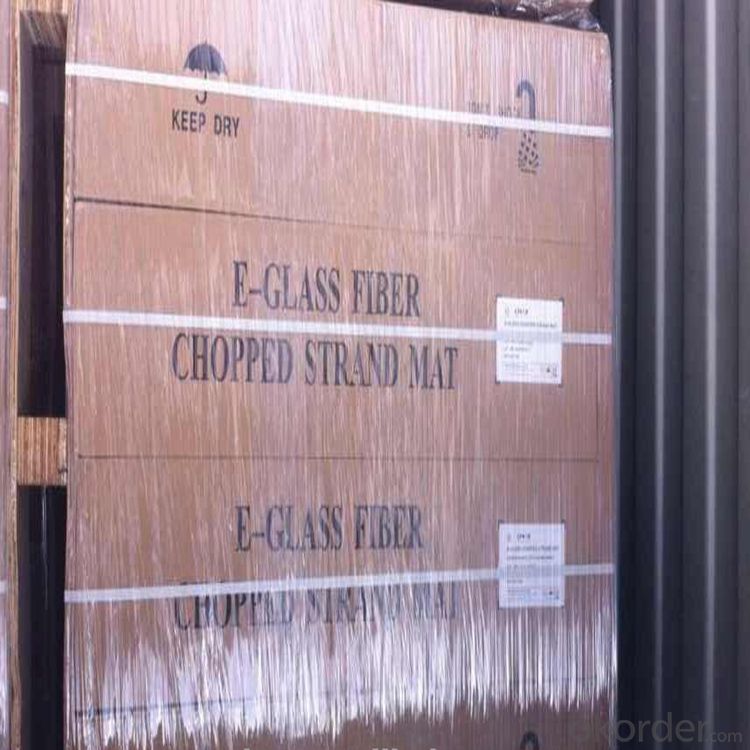
Product Storage:
Unless otherwise specified, Chopped Strand Mat should be stored in a dry, cool and rain-proof area. It is recommended that the room temperature and humidity should be always maintained at 15℃~35℃ and 50%~75% respectively.
Company Information
CNBM (China National Building Material) Group is the largest comprehensive building materials group in China that in integrate scientific research, manufacturing and logistics into one entity. The largest building materials and equipment specialists in China. Upon State Council approval, today CNBM owned more than 300 subordinate manufacturing factories and servicing companies. There are 6 fully owned public listed companies and 11 partially owned with substantial shares public listed companies. In many of these fields, CNBM is playing the leading role in the building industry in the country.
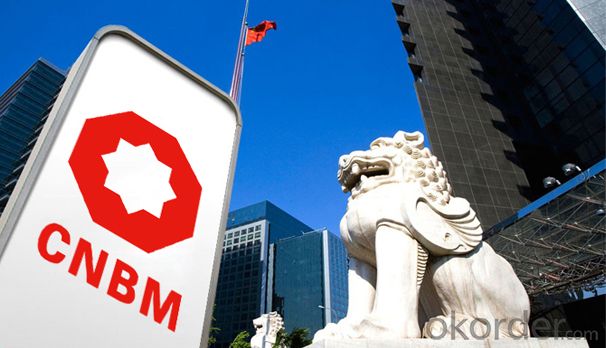
Order Information
Ordering please specify:
1. the product code, 2. weight, 3. width, 4. order quantity, 5. packaging, 6. special requirements please specify.
FAQ:
1. How long will you get reply?
Any inquiry will be replied within 24 hours. Usually we will reply within 12 hours.
2. How long is warranty period?
We provide 3 year warranty period.
3. What is your MOQ?
Any order quantity is available.
4. Can you provide sample?
Yes, samples are in stock. we can offer free sample for you.
5. Payment terms?
We can accept L/C, T/T, Western Union, Paypal etc.
6. Do you offer OEM service?
Yes, we can print customers’ logo on the packaging;
And the size and specification can be produced and design according to your demand.
7. What is the Production Lead Time?
15-20 days for bulk production after confirm the order.
- Q: How does the fiber content affect the mechanical properties of fiberglass chopped strand composites?
- The fiber content in fiberglass chopped strand composites directly affects their mechanical properties. Increasing the fiber content generally enhances the strength, stiffness, and load-bearing capacity of the composites. This is because the fibers act as reinforcements, distributing stress and improving the overall structural integrity. Higher fiber content also improves resistance to cracks, impacts, and other forms of mechanical damage, making the composites more durable. However, there is a limit to the fiber content that can be added, as excessive amounts may result in decreased workability and increased brittleness. Therefore, finding the optimal fiber content is crucial to achieving the desired mechanical properties in fiberglass chopped strand composites.
- Q: What are the disadvantages of using fiberglass chopped strand?
- There are several disadvantages of using fiberglass chopped strand. Firstly, fiberglass chopped strand has a lower tensile strength compared to other reinforcement materials such as carbon fiber. This means that it may not be as effective in providing structural support in certain applications. Secondly, fiberglass chopped strand is prone to fraying and splitting. This can make it difficult to handle and work with, as it may require additional steps such as sealing the ends to prevent further damage. Additionally, fiberglass chopped strand is not as resistant to heat as some other materials. It can start to degrade and lose its properties at high temperatures, limiting its use in applications where heat resistance is crucial. Furthermore, fiberglass chopped strand has poor resistance to chemicals and solvents. It can easily be damaged or weakened when exposed to certain substances, which can limit its usability in various industries. Lastly, fiberglass chopped strand is not biodegradable and can be difficult to recycle. This can pose environmental concerns, especially when used in large quantities or disposed of improperly. Overall, while fiberglass chopped strand has its advantages such as being lightweight and cost-effective, it is important to consider these disadvantages before choosing it as a reinforcement material.
- Q: How does the impact resistance of the chopped strand affect its performance?
- The impact resistance of chopped strand directly affects its performance by determining its ability to withstand external forces or impacts without breaking or cracking. A higher impact resistance means that the chopped strand is more durable and less likely to suffer damage from sudden impacts, resulting in improved overall performance and longevity in applications where it is used.
- Q: What are the different sizes available for fiberglass chopped strand?
- Fiberglass chopped strand comes in a variety of sizes to meet different needs and specifications. The typical sizes for fiberglass chopped strand include 1/8 inch (3 mm), 1/4 inch (6 mm), and 1/2 inch (12 mm), which refer to the length of the fibers that have been cut. The choice of size depends on the specific requirements of the project at hand. Smaller sizes are often used when a smoother finish is desired or when working with thinner materials. They are also well-suited for applications like resin transfer molding (RTM) and vacuum infusion processes. On the other hand, larger sizes are commonly employed in applications that call for increased strength and reinforcement, such as in the production of fiberglass-reinforced plastics (FRP), composites, and concrete. It is crucial to select the correct size of fiberglass chopped strand based on the project's requirements, desired mechanical properties, and the manufacturing process being utilized. Seeking guidance from a supplier or an expert in the field can assist in determining the most appropriate size for a particular application.
- Q: Is fiberglass chopped strand biodegradable?
- No, fiberglass chopped strand is not biodegradable. Fiberglass is a type of reinforced plastic made from glass fibers and a polymer resin. The glass fibers do not break down naturally, and the polymer resin is typically non-biodegradable as well. This means that fiberglass chopped strand will persist in the environment for a long time and does not decompose through natural processes.
- Q: How does the fiber-matrix adhesion distribution of fiberglass chopped strand affect the properties of composites?
- The properties of composites are greatly affected by the way in which the fibers and matrix material in fiberglass chopped strand are bonded together. Fiberglass chopped strand composites consist of individual glass fibers that are embedded in a polymer resin or other matrix material. The strength and stiffness of the composite are determined by the level of adhesion between the fibers and the matrix. A higher level of adhesion results in better load transfer, resulting in increased strength and stiffness. Conversely, a weak bond can lead to reduced overall strength and stiffness. The distribution of the adhesion between the fibers and the matrix also affects the durability and resistance to fatigue of the composite. A uniform distribution of adhesion ensures that the load is evenly spread across the fibers, reducing the likelihood of fiber debonding or delamination. This improves the durability and resistance to fatigue, making the composite less prone to cracking, deformation, and failure under cyclic loading conditions. Furthermore, the adhesion distribution influences the thermal and chemical resistance of the composite. A strong and uniform adhesion helps to efficiently transfer stress, reducing the risk of localized heating and thermal degradation. Similarly, a good adhesion distribution prevents the penetration of chemicals into the composite, protecting it against chemical degradation. In conclusion, the distribution of adhesion between the fibers and the matrix is a crucial factor that affects the mechanical, durability, thermal, and chemical properties of fiberglass chopped strand composites. A strong and uniform distribution enhances the strength, stiffness, durability, resistance to fatigue, thermal resistance, and chemical resistance of the composites, making them suitable for a range of applications in industries such as automotive, aerospace, construction, and marine.
- Q: How does the fiber content affect the thermal conductivity of fiberglass chopped strand composites?
- The fiber content in fiberglass chopped strand composites affects the thermal conductivity by increasing it. As the fiber content increases, the thermal conductivity of the composite also increases. This is because the fibers act as conductive pathways for heat transfer, allowing it to easily flow through the composite. Therefore, a higher fiber content leads to a higher thermal conductivity in fiberglass chopped strand composites.
- Q: Can fiberglass chopped strand be used in water treatment tanks?
- Indeed, water treatment tanks can utilize fiberglass chopped strand. Renowned for its remarkable corrosion resistance and impressive strength-to-weight ratio, fiberglass proves to be a fitting material for a multitude of water treatment industry applications. By employing chopped strand fiberglass, the tanks gain reinforcement, enhancing their durability and resilience against deterioration. Furthermore, fiberglass remains non-reactive to water and refrains from releasing any hazardous substances, a pivotal aspect in the preservation of water quality within treatment tanks. All in all, fiberglass chopped strand emerges as a dependable and efficacious material choice for implementation in water treatment tanks.
- Q: What is the average diameter of fiberglass chopped strand?
- The average diameter of fiberglass chopped strand typically ranges from 10 to 25 micrometers. However, it is important to note that the specific diameter can vary depending on the manufacturer and specific product type.
- Q: What are the typical mechanical properties of fiberglass chopped strand composites?
- The typical mechanical properties of fiberglass chopped strand composites include high tensile strength, good flexural strength, excellent impact resistance, and low density. They also exhibit good dimensional stability, low thermal expansion, and high corrosion resistance.
Send your message to us
Fiberglass Chopped Strand Mat for FRP Pipe / Heated Floor Mat
- Loading Port:
- China main port
- Payment Terms:
- TT OR LC
- Min Order Qty:
- 50 kg
- Supply Capability:
- 10000 kg/month
OKorder Service Pledge
OKorder Financial Service
Similar products
Hot products
Hot Searches
Related keywords
